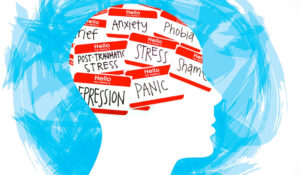
The pandemic has cost more than just lives, jobs, and social relationships through its course. Individuals suffering from mental illness and substance abuse disorders are also facing the pressure of COVID-19.
On Friday, the Undergraduate Student Success Center, in partnership with FYE Peer Mentors program, hosted a mental health workshop. The event was open to students with the intention to help them learn healthy coping mechanisms pertaining to mental illnesses.
The workshop opened with a thirty-second mindfulness meditation exercise where participants were to simply practice being present in the moment. This training focused on helping individuals become more attentive to themselves, particularly in stressful situations.
“Mental health affects the way we think, how we socialize and how we deal with conflict,” said Marion Boyd, certified professional life coach and mental health advocate. “People don’t realize how big of an impact it has on our existence and it affects every aspect of our life whether it’s temporary or permanent.”
Statistically, more than 50 percent of citizens living in the United States of America will be diagnosed with a mental illness or disorder at some point in their lifetime, according to the CDC’s “Learn About Mental Health.”
In a survey conducted by the World Health Organization, the COVID-19 pandemic has undermined or halted essential mental health services in 93 percent of countries worldwide, in turn, increasing the demand for mental health.
Additionally, the chronic underfunding of mental health makes it more difficult for those who face mental obstacles to express what they are experiencing.
“One of the leading causes of mental health issues today is the failure to speak up or speak out about the things we are facing,” said Boyd. “Just like we devote hours a week to going out, eating out, and hanging with friends, we have to devote just as much time to prioritize our minds.”
When stress becomes overwhelming it prolongs the risks for mental health problems and medical problems increase.
However, for those who do not feel comfortable speaking out, there are many ways to find healthy coping outlets. This includes: journaling, spiritual guidance, establishing a healthy productive routine, and going for nature walks.
Although the main focus of the session was coping with mental health as a result of covid-19, Boyd made sure to address internal issues that may affect students’ mental well-being. She touched on issues such as eating habits, stress triggers, and generational patterns. As Boyd opened up about her own personal issues, students were reluctant enough to also share their concerns and problems they face as well.
The importance of self-care in relation to managing mental health was also touched upon in the meeting.
“Mental health becomes a problem when it begins to affect your daily life. Anything that affects the way you normally do something is an early sign of mental health issues,” said Boyd.
If you notice yourself having feelings of loneliness, losing interest in things you like to do, or being combative or irate for no reason, it may be time to reach out and talk to someone for help.
Students at Florida A&M University can reach out to the Office of Counseling Services, free of charge, during their operating hours located on their website.